Tech Policy Press/YouGov Poll Finds Support for US Surgeon General Warning Label for Social Media
Gabby Miller, Ben Lennett / Jul 12, 2024
Image of young girl using a smartphone.
With the polling firm YouGov, Tech Policy Press is conducting field polls in the US over the next few months leading up to the 2024 election. Every two weeks, the polls will ask a series of questions to capture the American public’s perceptions of issues at the nexus of technology and democratic processes. The questions will focus on how voters understand the role of technology platforms in elections and on other significant tech-related issues relevant to the democratic process and online safety.
Related Reading: Poll Finds Widespread Distrust of Social Media in US Election Cycle
Overview of poll results
Tech Policy Press asked five questions to an online sample of 1,072 voters between June 28 and July 1, 2024, to better understand the public’s views on measures and proposals to protect children on the internet and social media.
Surgeon General Warning for Social Media: Are you in favor of a surgeon general’s warning label for adolescents?
- 65% of those surveyed were in favor of a warning label, while 17% were not, and 18% were not sure. These views were similar across respondents based on their Party lean. 69% of Democrat respondents, 63% of Independent respondents, and 62% of Republican respondents were in favor of the warning label.
Smartphone Ban in Schools: Lately, some have proposed banning the use of smartphones in schools. For each of the following levels of schooling (elementary, middle school, and high school), please say whether you believe smartphones should be banned in those types of schools.
- 51% of those surveyed believed that smartphones should be banned in all grades, with overwhelming support for banning smartphones in elementary school (86%) and middle school (74%). Respondents were more divided on smartphone bans in high school, with 49% for them and 51% against.
Social Media Restriction Age: Some lawmakers in multiple states and in the federal government favor age limits on the use of social media to prevent children and teens below a certain age from accessing social media. What age do you think is the appropriate age for teens to access social media?
- Only 6% of respondents respectively believed that it was appropriate for 13 or 14-year-old children to access social media, 11% for 15-year-olds, 19% for 16-year-olds, and 15% for 17-year-olds. 37% of respondents believed that parents should decide whether children or teens access social media. These parental control figures were similar for Democrat and Republican respondents; however, 48% of Independents believed that parents should make the decision.
Collecting Personal Information of Children and Teens: Proposed legislation in Congress would ban apps and websites, including social media platforms, from collecting, compiling, or using personal information to target advertising to children and teens. Generally speaking, do you [support or oppose] this legislation?
- 59% of respondents strongly supported legislation that bans data collection used to target advertising to children and teens, 27% somewhat supported it, and only 8% opposed it. 5% were not sure.
TikTok Ban: The US recently passed a law requiring ByteDance, the Chinese company that owns TikTok, to sell the company or face a ban of the app. On balance, do [you] believe banning TikTok [would or would not] be good for society?
- Respondents were divided on the question, with 44% believing that banning TikTok would benefit society, compared to 33% who did not. 23% of respondents did not know. 53% of Republican respondents favored the ban, compared to 36% of Democratic and 40% of Independent respondents.
What follows is a detailed consideration of the results.
Respondents Overwhelmingly Support Surgeon General Social Media Warning Label
In June, US Surgeon General Dr. Vivek Murthy made the case for requiring a surgeon general’s warning label on social media platforms. The label would warn of the “significant mental health harms for adolescents” associated with social media, according to the New York Times guest essay he wrote. Meanwhile, the research community is deeply divided on whether there’s a direct correlation between social media usage and rising rates of depression and anxiety among teens. Dr. Murthy’s call, which would require congressional approval, both reinvigorated this debate and signaled a shift in the government’s willingness to tamp down on social media in the name of public safety.
The overwhelming majority of respondents polled by Tech Policy Press/YouGov said they were in favor of the surgeon general adding a warning label to social media platforms. While nearly a fifth of respondents said they were unsure about adding a warning label, about two-thirds said they supported the move.
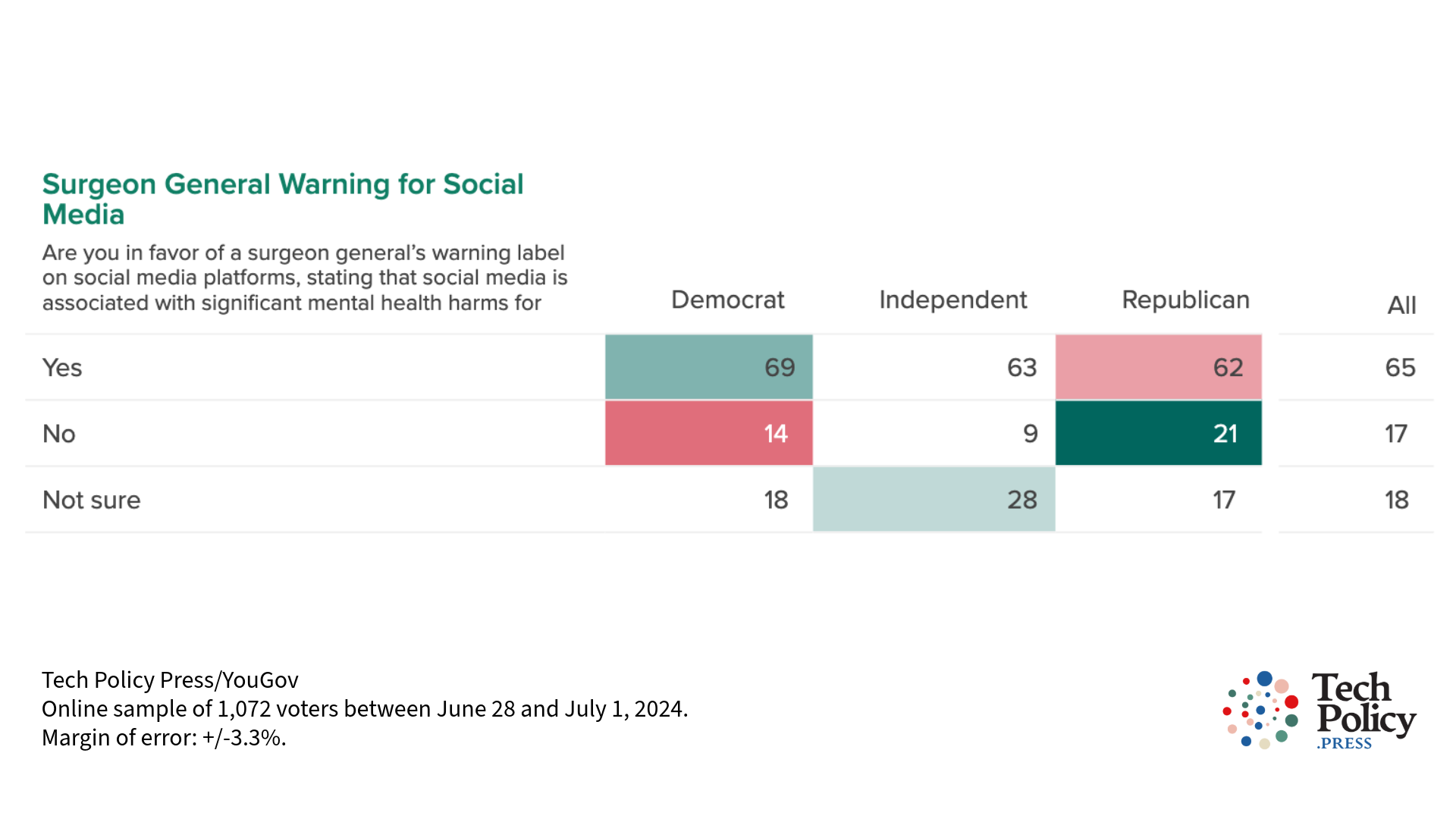
Responses to “Are you in favor of a surgeon general’s warning label for adolescents?” broken down by respondents’ party lean.
Being a parent made virtually no difference in whether respondents favored a surgeon general’s warning label. However, there were some differences along party lines. Democratic respondents were slightly more in favor of adding a warning label, polling about seven points higher than Republicans in this category.
Banning Smartphones in Elementary and Middle School Is Popular
Legislation banning smartphones in schools has gained traction in recent years. While California Governor Gavin Newsom approved legislation in 2019 that would allow schools and their respective districts to limit or ban students’ use of cell phones at school, he’s since called for statewide restrictions. (Newsom announced this new policy approach a day after Surgeon General Murthy called for social media warning labels in June.) New York’s Governor Kathy Hochul also recently announced plans to introduce a bill banning smartphones from schools in the next legislative session, which begins in January 2025, according to The Guardian.
When asked what level of schooling respondents believe it would be appropriate to ban smartphones, the poll results show that restrictions should be relaxed as students advance through school. For instance, 86% of respondents believe smartphones should be banned in elementary schools and 74% in middle schools, whereas only around half think they should be banned in high schools. Respondents were evenly divided on whether smartphones should be banned at all grade levels.
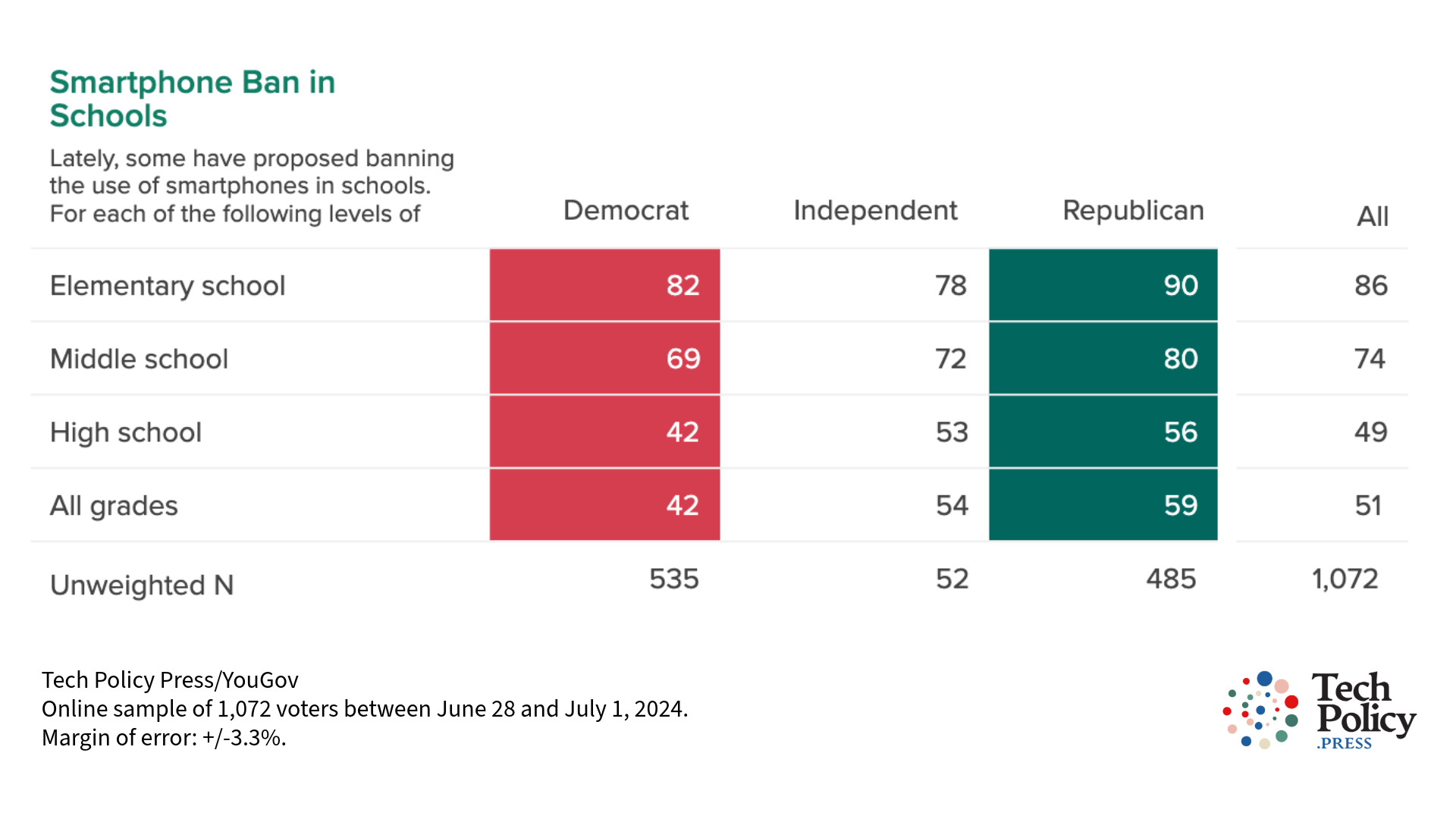
Responses to question about whether smartphones should be banned in schools at each level of schooling (elementary, middle school, and high school) and broken down by party lean.
The poll results show that Republicans support more restrictive smartphone policies at every grade level compared to their Democratic counterparts. Republican support for a ban on smartphones in elementary school was eight points higher than Democrats, eleven points higher for a ban in middle school, and 14 points higher for a high school ban.
Range of Opinions on Appropriate Age for Children to Access Social Media
In the absence of meaningful federal legislation, many states are moving to pass or update laws focused on child online safety. Legislators in New Mexico, Maryland, and more are working to update their privacy laws – and in Connecticut’s case, succeeding – that require social media companies to make children-specific ‘safety by design’ changes to their platforms and perform safety assessments. Other states are seeking age verification laws that limit minors’ access to an app without parental consent. Utah was the first state to pass such a law in March.
When asked what the appropriate age is for teens to access social media, just 6% of respondents thought it was appropriate for 13- or 14-year-olds to access social media for those respective age categories. Support increased somewhat for access by older teens, with 19% believing it was appropriate for 16-year-olds and 15% for 17-year-olds. However, more than a third of respondents think parents should decide what age is appropriate rather than the government.
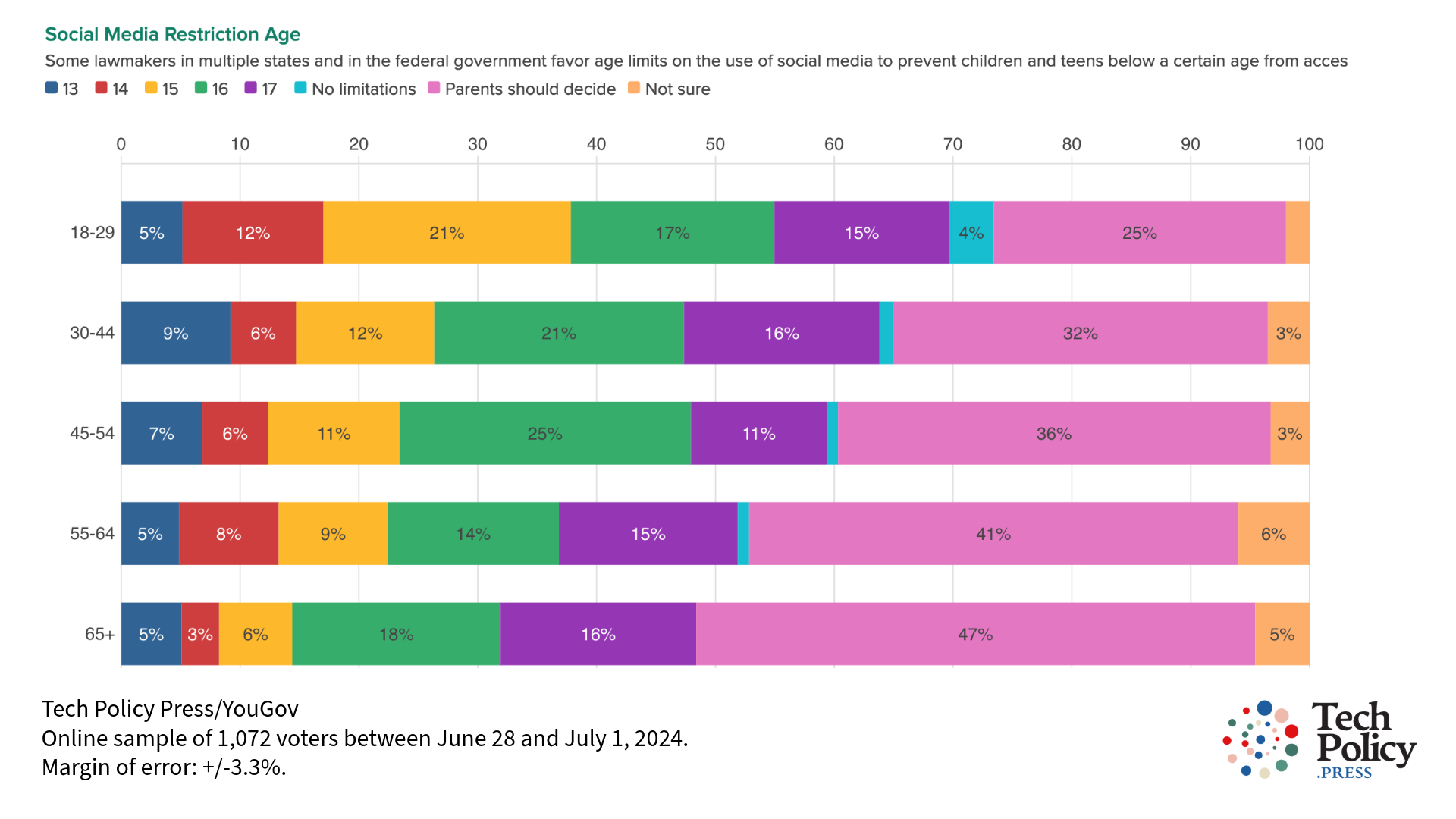
Responses to “What age do you think is the appropriate age for teens to access social media?” broken down by respondents’ age range category.
Respondents' ages somewhat changed how they viewed age restrictions for social media. Only 3% of respondents aged 65 years or older believed it was appropriate for 14-year-olds to access social media, compared to 12% of respondents aged 18 to 29. About one-fifth of these same respondents thought it was appropriate for 15-year-olds to access social media compared to just 6% of their older counterparts. Moreover, nearly half of respondents 65 and up believed that parents should determine the appropriate age, while only about a quarter of young adults believed it should be up to parents to decide.
Most Voters Support Legislation Limiting the Collection of Kids’ Personal Information
Congress has proposed legislation that would ban apps and websites, including social media platforms, from collecting, compiling, or using personal information to target advertising to children and teens. One such bill is COPPA 2.0, which would update the existing Children and Teens’ Online Privacy Protection Act (COPPA) from 1998.
The Tech Policy Press/YouGov poll shows that respondents overwhelmingly support limiting the collection of children and teens’ personal information, with 86% of respondents supporting legislative limitations versus only 8% opposing them.
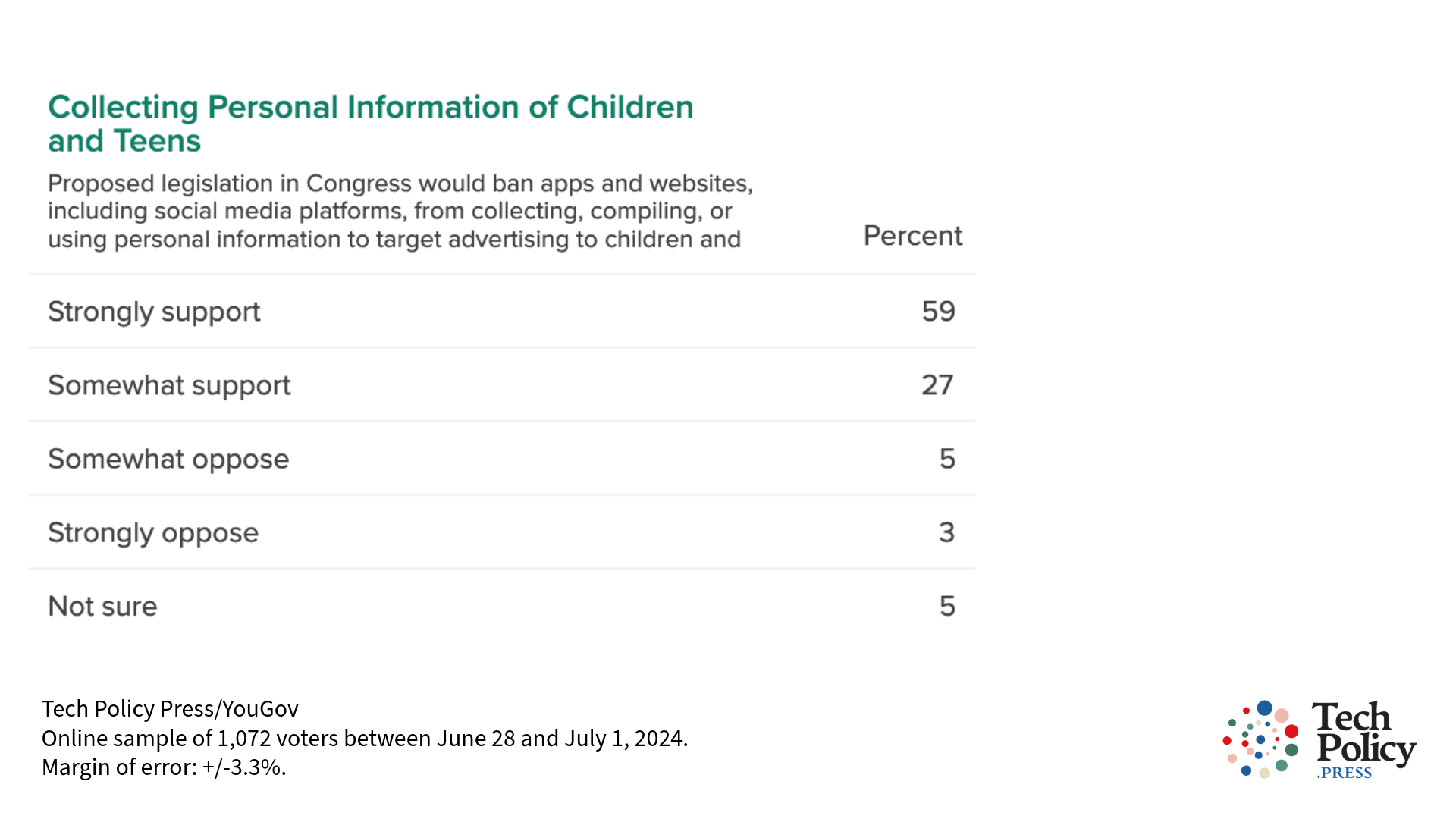
Responses to poll question on whether respondents' generally support or oppose proposed legislation in Congress that would ban social media companies from collecting, compiling, and using children and teens' personal information for targeted advertising.
Social media usage was one of the largest determinants of how strongly survey respondents felt about passing this type of legislation. Among those who said they do not use social media at all, 82% strongly support limiting how platforms collect kids' personal information, compared to only 6% who say they only somewhat support it. Those who use Instagram, YouTube, and X, formerly known as Twitter, were also more likely to strongly support limiting these data collection practices for kids.
The Public is Divided about the TikTok Ban
The US recently passed a law requiring ByteDance, the Chinese company that owns TikTok, to sell the company or face a ban of the app. When asked whether banning TikTok would be good for society, 44% of respondents believed it would be a net positive, whereas one-third believed the opposite. About a quarter were unsure about how a TikTok ban would impact society.
Respondents’ gender was a significant determinant in how they felt about the TikTok ban. Men who believe a ban would positively affect society polled ten points higher than women. In contrast, women were nearly twice as likely as men to be unsure about the impact of the ban.
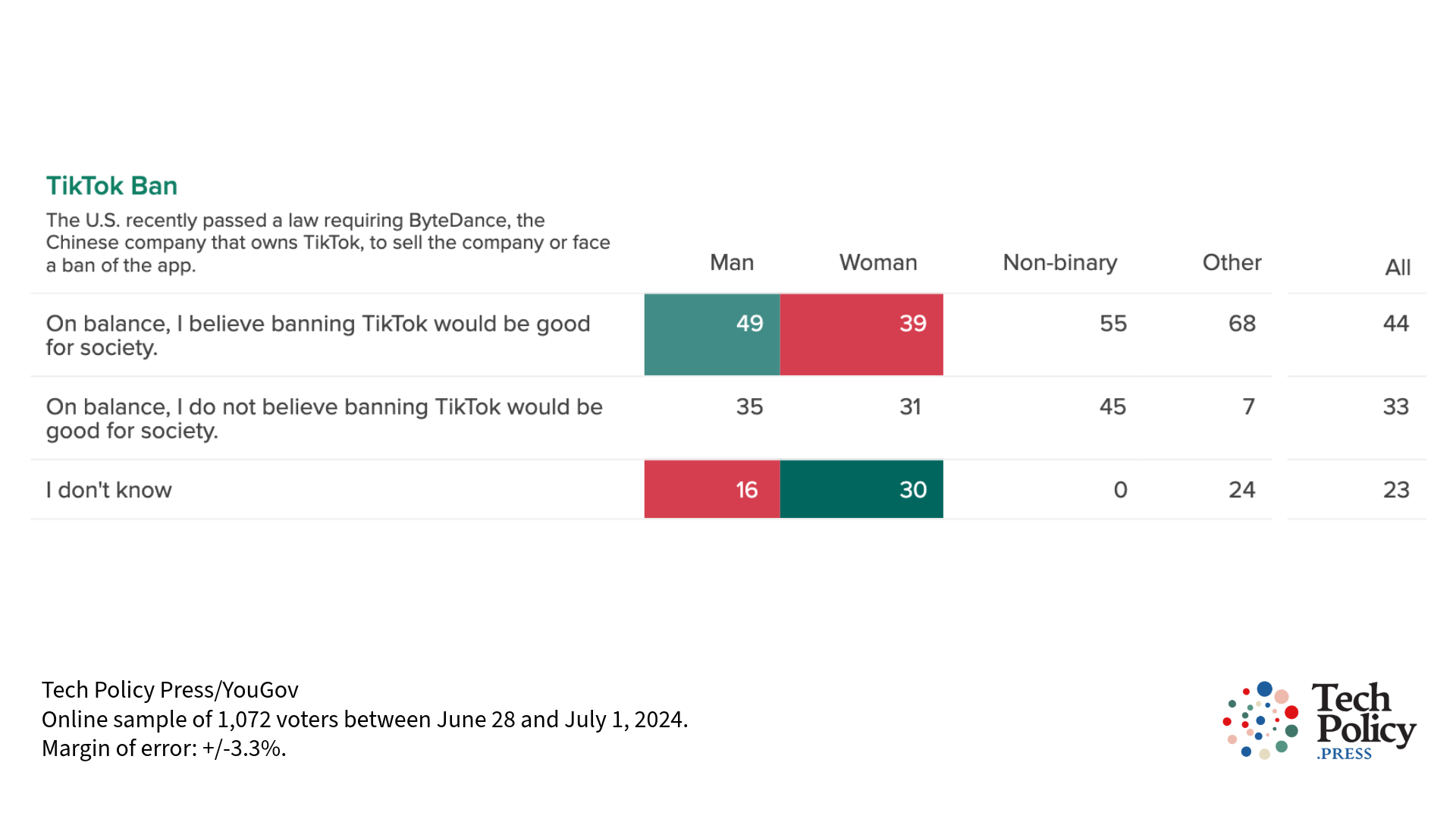
Responses to “On balance, do [you] believe banning TikTok [would or would not] be good for society?” broken down by respondents’ gender.
Social media usage also largely influenced respondents' feelings about banning the social media video app. TikTok users overwhelmingly believed banning the app would be bad for society, with 59% opposed to the ban and just a quarter saying that society would benefit. Respondents who used Discord, Twitch, WhatsApp, and Snapchat were also more likely to oppose the ban than Instagram users, who were evenly split on the issue.
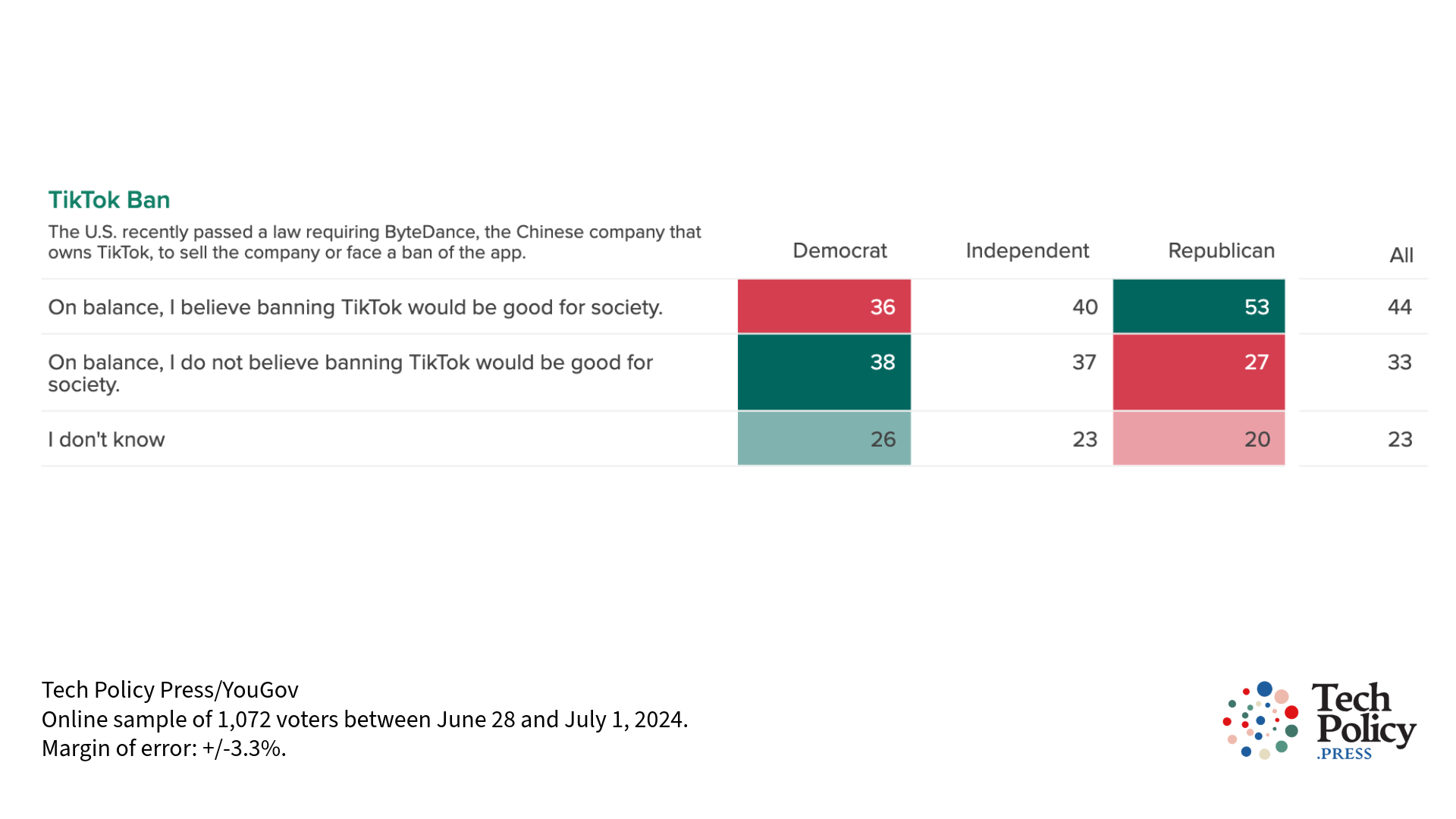
Responses to “On balance, do [you] believe banning TikTok [would or would not] be good for society?” broken down by respondents’ party lean.
Republicans were also more likely to believe banning TikTok would be positive for society, polling seventeen points higher than Democrats.
The full dataset can be downloaded here.
Authors

